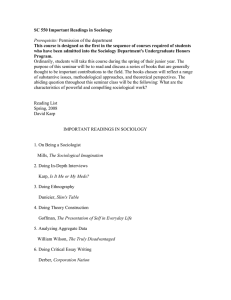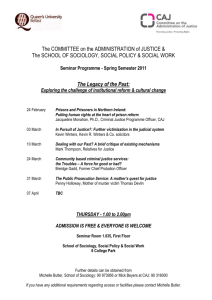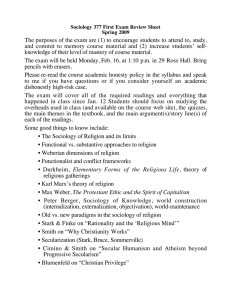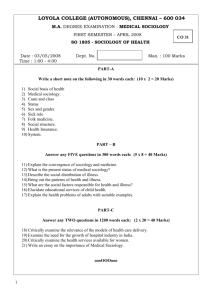Week 2 Seminar: What is Medical Sociology?
advertisement
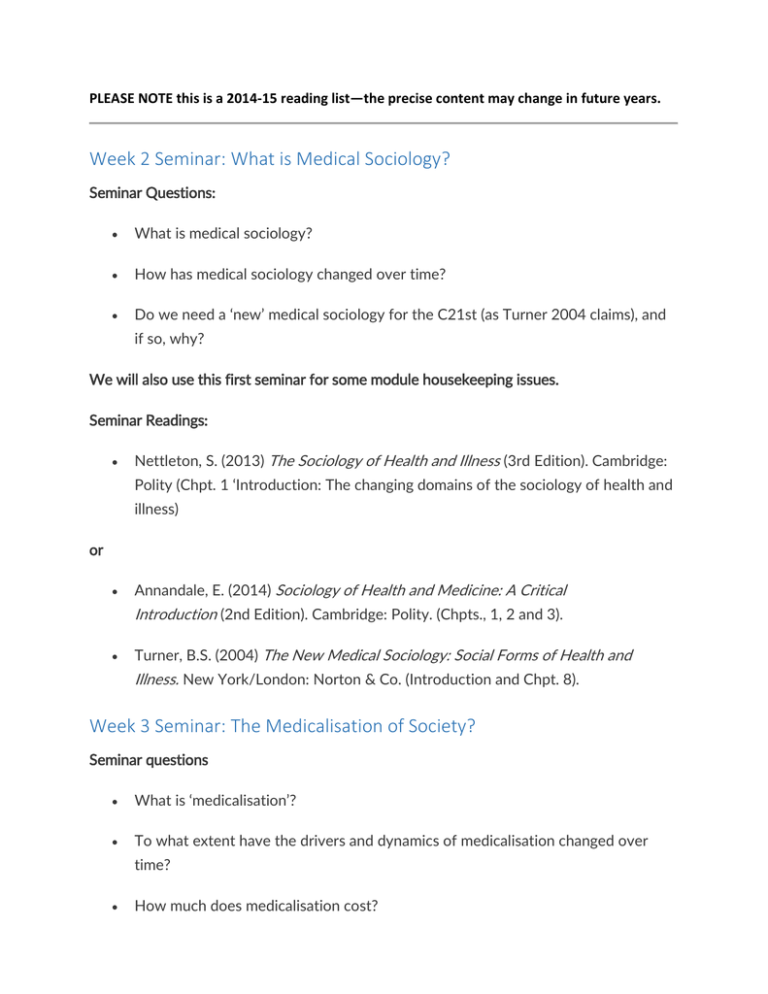
PLEASE NOTE this is a 2014-15 reading list—the precise content may change in future years. Week 2 Seminar: What is Medical Sociology? Seminar Questions: What is medical sociology? How has medical sociology changed over time? Do we need a ‘new’ medical sociology for the C21st (as Turner 2004 claims), and if so, why? We will also use this first seminar for some module housekeeping issues. Seminar Readings: Nettleton, S. (2013) The Sociology of Health and Illness (3rd Edition). Cambridge: Polity (Chpt. 1 ‘Introduction: The changing domains of the sociology of health and illness) or Annandale, E. (2014) Sociology of Health and Medicine: A Critical Introduction (2nd Edition). Cambridge: Polity. (Chpts., 1, 2 and 3). Turner, B.S. (2004) The New Medical Sociology: Social Forms of Health and Illness. New York/London: Norton & Co. (Introduction and Chpt. 8). Week 3 Seminar: The Medicalisation of Society? Seminar questions What is ‘medicalisation’? To what extent have the drivers and dynamics of medicalisation changed over time? How much does medicalisation cost? In what ways (if at all) do ‘medicalisation’ and ‘biomedicalisation’ differ as sociological concepts? Seminar readings/Podcasts Conrad interview with Gabe ‘Developing the medicalisation thesis’ – Sociology of Health & Illness Conrad, P. (2005) The Shifting engines of medicalization. Journal of Health and Social Behavior. 46 (March): 3-14. Conrad, P., Mackie, T. and Mehrotra, A (2010) Estimating the costs of medicalization. Social Science and Medicine. 70: 1943-47. Clarke, A., Mamo, L., Fishman J., Shim, J K and Fosket J.F (2003) Biomedicalization: technoscientific transformations of health, illness and US biomedicine. American Sociological Review. 68 (April): 161-94. Week 4 Seminar: Pharmaceuticalisation Seminar questions Is Moynihan right to suggest that many cases of medicalisation today are better regarded as ‘disease mongering’? Can you find any good examples of ‘disease mongering’? What is the relationship between disease mongering and pharmaceuticalisation (given they are not the same)? Seminar readings Busfield, J. (2010) ‘A pill for every ill’? Explaining the expansion in medicine use. Social Science and Medicine. 70, 6: 934-41. Moynihan, R., Heath, I and Henry, D. (2002) Selling sickness: the pharmaceutical industry and disease mongering.. British Medical Journal. 324 (April 13th): 886-90. Special issue of Public Library of Science – Medicine (2006), volume 3, issue 4 (April): a series of papers on disease-mongering, select any you are particularly interested in. Williams, S.J., Gabe J. and Martin, P. (2011) The pharmaceuticalisation of society? An analytical framework. Sociology of Health & Illness. 33, 5: 710—25. (See also rejoinder by Abraham and reply by us in this same issue). Week 5 Seminar: Lay 'Experts' (in the Information Age)? Seminar questions: Is ‘lay expertise’ a contradiction in terms when it comes to matters of health and illness? How significant is the advent of the so-called ‘information age’ in this regard? Seminar readings: Shaw, I. (2002) How lay are lay beliefs? Health. 6, 3: 287-99. Prior, L. (2003) Belief, knowledge and expertise. Sociology of Health and Illness. 25, 3 (Silver Anniversary Issue): 41-57. Nettleton, S. Burrows, R. and O’Malley, L. (2005) The mundane realities of the everyday use of the internet for health and their consequences for media convergence. Sociology of Health and Illness. 27, 7: 972-992. Fox, N.J, Ward, K and O’Rourke, A.J. (2005) The ‘expert patient’: Empowerment or medical dominance? The case of weight loss, pharmaceutical drugs and the Internet. Social Science and Medicine. 60: 1299-1309. Week 6 Seminar: Patient-Professional Encounters Seminar questions: In what ways do ‘consensus’, ‘conflict’ and ‘negotiation’ approaches to the doctorpatient relationship differ? Is consumerism reconfiguring the doctor-patient relationship? What about other patient-professional relationships in health care? Seminar readings Nettleton, S. (2013) The Sociology of Health and Illness (3rd Edition). Cambridge: Polity Press (Chpt. 6 ‘The Sociology of Lay-Professional Interactions’) Lupton D. (1997) Consumerism, reflexivity and the medical encounter. Social Science and Medicine. 45, 3: 373-81. Week 7 Seminar: Ageing Bodies/ Technogenarians? Seminar questions: Is ageing all about decline and disadvantage? Are older people becoming ‘technogenerians’? Are there limits to what can or should be done here? Seminar readings: Gilleard, C. and Higgs, P. (1998) Ageing and the limiting conditions of the body. Sociological Research Online. 3, (4) www.socresonline.org.uk/3/4/4.html. Special issue on ‘Technogenarians’ Sociology of Health and Illness. 32, 2: 171-180. (especially articles on ‘anti-ageing medicine’). Williams, S.J, Higgs, P. and Katz, S (2012) Neuroculture, active ageing and the ‘older brain’: Problems, promises and prospects. Sociology of Health and Illness. 34, 1: 64-78. Week 8 Seminar: Chronic Illness as Biographical Disruption? Seminar questions: Does ‘biographical disruption’ mask as much as it reveals when it comes to the meaning and experience of chronic illness? Is it time to rethink the sociology of chronic illness and disabling conditions? If so, in what ways? Seminar Readings: Carricaburu, D,. and Pierett, J. (1995) From biographical disruption to biographical reinforcement.: the case of HIV-positive men. Sociology of Health and Illness. 17: 65-88; Faircloth, C.A., Boylstein, C, Rittman, M., Young, ME, Gubrium, J. (2004) Sudden illness and biographical flow in narratives of stroke recovery. Sociology of Health and Illness. 26. 2: 242-61; Pound, P. , Gompertz, P, and Embrahim, S. (1998) Illness in the context of older age: the case of stroke. Soiciology of Health and Illness. 20, 4: 489-506. Williams S.J. (2000) Chronic illness as biographical disruption or biographical disruption as chronic illness? Reflections on a core concept. Sociology of Health and Illness. 22, 1: 40-67. Scambler, G. (2009) Review article: Health-related stigma. Sociology of Health & Illness. 31: 441-55. Scambler G and Scambler, S. (eds.) (2010) New Directions in the Sociology of Chronic and Disabling Conditions. Basingstoke: Palgrave Macmillan. (esp introduction by Scambler and Scambler, and chapter 3 by Thomas, chapter 9 by Bury, chapter 11 by Williams) Week 9 Seminar: The Medicalisation and Politicisation of Sleep Matters? Seminar question: What sociological light does sleep shed on the 24/7 society? Is sleep another case of the medicalisation of life? Can we speak of a growing ‘politicisation’ of sleep matters today, and if so, in what ways? Seminar readings: Coveney, C. (2014) Managing sleep and wakefulness in a 24-hour world. Sociology of Health and Illness. 36, 1: 123-36. Coveney, C., Williams, S.J. and Gabe, J. (2014) The sleep of the nation: Problems and Prospects. Discover Society (August) Kroll-Smith, S. (2003) Popular media and ‘excessive daytime sleepiness’: a study of rhetorical authority in medical sociology. Sociology of Health and Illness. 25, 6: 625-43. Williams, S.J. (2011) The Politics of Sleep. Basingstoke; Palgrave Macmillan (chpt 5). Williams, S.J. (2013) Medicalisation or customisation? Sleep, enterprise and enhancement in the 24/7 Society. Social Science and Medicine. (Feb) 79: 40-7. Seminar Questions - week 10 WEEK 10 SEMINAR: VULNERABLE BODIES Seminar Questions: Have death and dying become sequestrated experiences in late/postmodernity? Key Seminar Readings: Lawton, J. (1998) Contemporary hospice care: the sequestration of the unbounded body and 'dirty dying’. Sociology of Health and Illness. 20, 2: 121-143. Walter, T. (2009) Jade’s dying body: The ultimate reality show. Sociological Research Online. 14, 5: www.socresonline.org.uk END TERM 1

